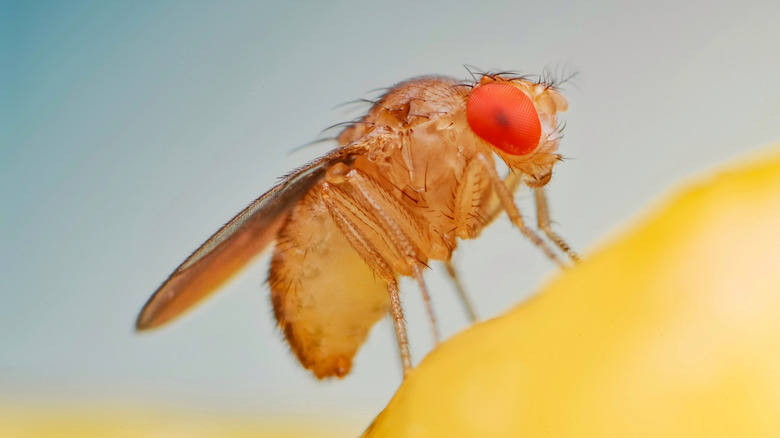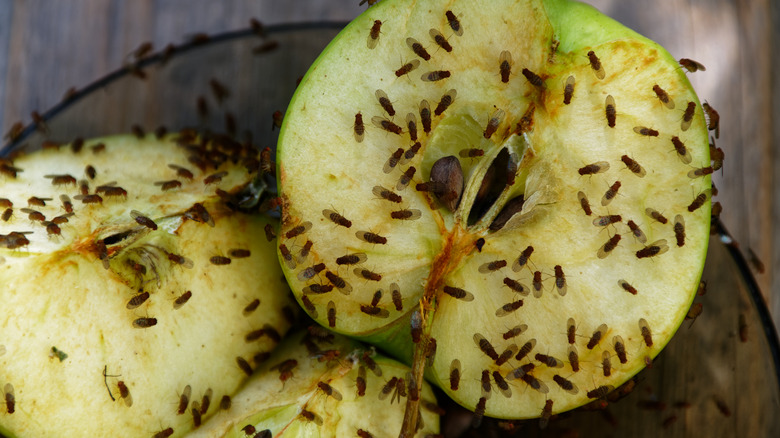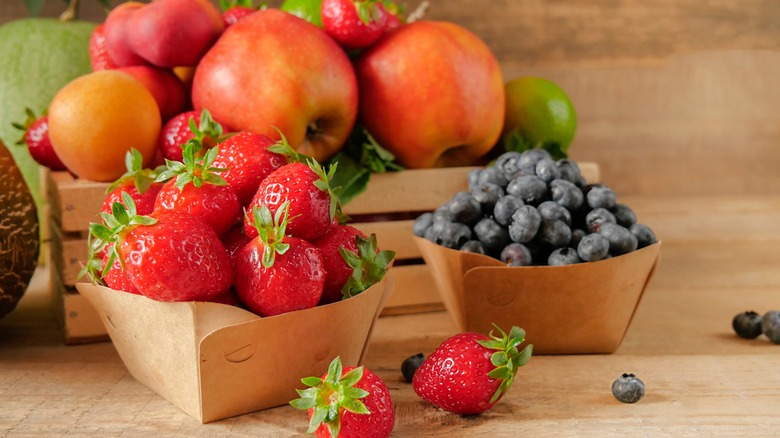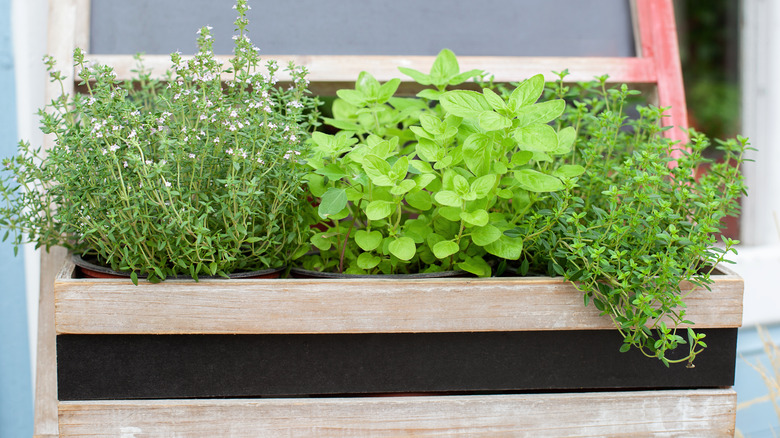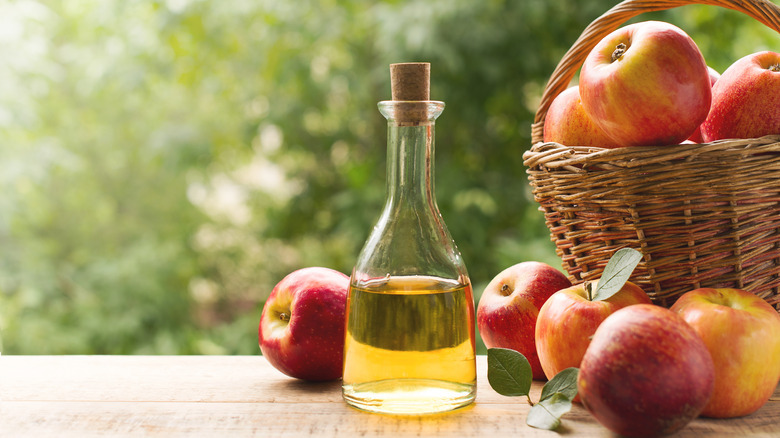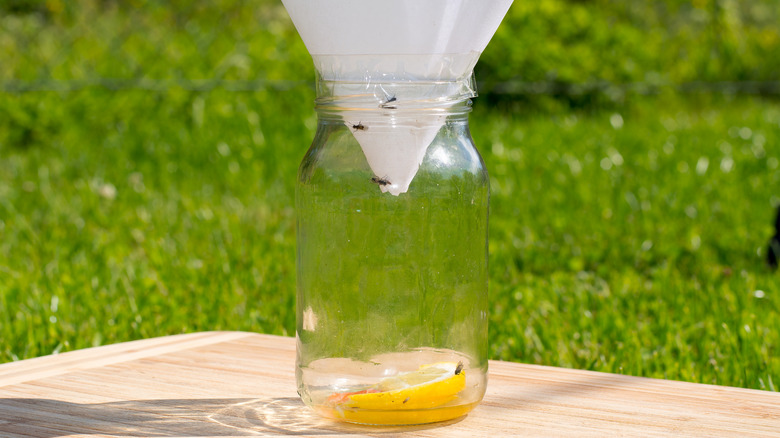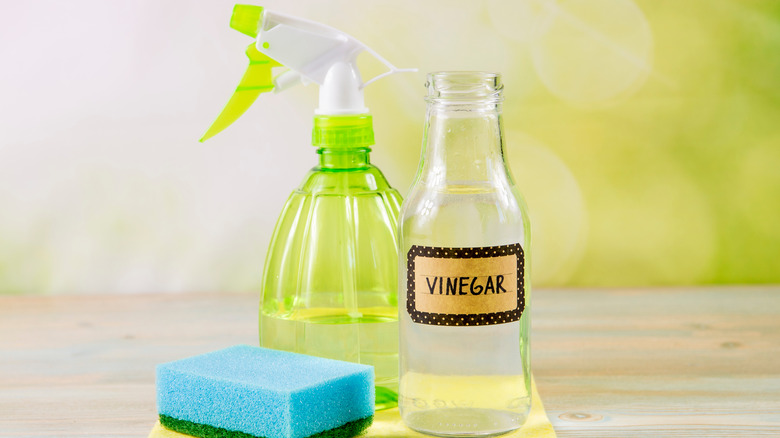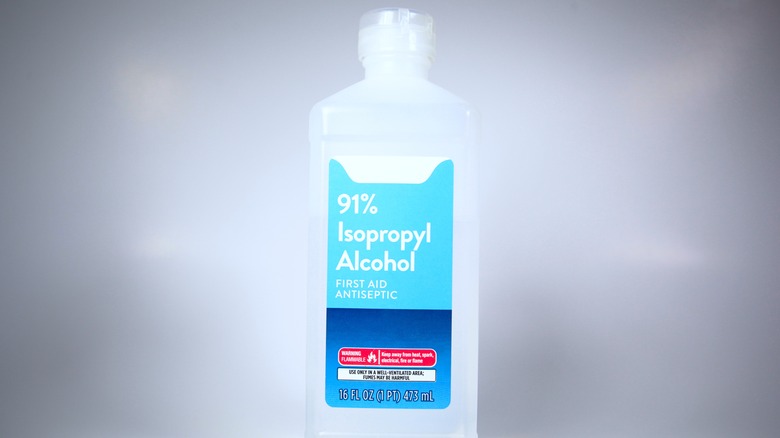How To Get Rid Of Fruit Flies Once And For All
While warm weather can signal the start of the summer season, it can also bring out a host of annoying pests such as mosquitoes, gnats, and houseflies. And while they can be an irritating part of summer, there are very few pests as annoying as fruit flies. Considered a year-round annoyance, fruit flies thrive in moist environments, including drains, garbage disposals, and trash cans, but they're most commonly found flying around rotten fruits and vegetables.
Although fruit flies typically only live for a few weeks or so, they can lay up to 500 eggs at one time, and if you're not careful, you'll end up with a fruit fly infestation in your home, Orkin warns. Infestations often occur in kitchens and other places where food can be found as these flies are attracted to decaying meat and sugary food waste, along with spilled soda, juice, and alcohol.
What are fruit flies?
Fruit flies are tiny insects attracted to ripened produce. Adults are about 1/8 inch long and are black and tan in color. These insects lay their eggs near rotting or over-ripened fruits and vegetables, where the larvae remain after hatching. Fruit flies are annoying, but they can also be dangerous if not contained, since they can contaminate your produce with bacteria and diseases.
There are actually various species of fruit flies that are prevalent in different areas of the world. In the wild, large populations have the potential to damage crops and decrease the yields of produce significantly. Fruit flies thrive in temperatures between 68 and 76 degrees. Unfortunately, this is the ideal indoor temperature range for many homes. In late summer, the abundance of decomposing end-of-season fruit can cause a boost in the fruit fly population. This, combined with falling temperatures, can lead to a large number of fruit flies looking for a comfortable refuge. This is why you might see more buzzing around your home as autumn rolls around.
Where do fruit flies come from?
Fruit flies can end up in your home in several ways. Fruit flies are super tiny. This allows them to enter your home through the smallest cracks and crevices. They are also able to fly through most window screens, seeking an ideal habitat and a place to lay their eggs. Once inside, their rapid reproduction rate allows them to multiply quickly and become a considerable nuisance.
Fruit flies can also be prevalent in your grocery store's produce department. Here, they lay their eggs on the surface of the fruits and veggies that are waiting to be purchased. However, Dr. Gregory Courtney, an entomologist at Iowa State University, told Time that if your food isn't overripe, the bugs aren't inside of the produce yet. Instead, they're sitting on the skin, which allows you to wash them off when you get home. So, the next time you go grocery shopping, rinse off your fruits and veggies and avoid purchasing any fermenting or bruised produce where an infestation could be buried inside.
Kitchen clean out
One of the first things you can do to avoid a fruit fly infestation is to get rid of any rotting or damaged produce in your home, such as old bananas, bruised apples, and musty-smelling potatoes, as Almanac recommends. While doing so, pay attention to how much of your fruit and vegetables you're actually getting rid of so you can plan ahead when buying and lessen the likelihood of an infestation in your house.
You should also thoroughly wash your remaining produce as fruit flies often lay their eggs on the surface of fruits and vegetables. If possible, Orkin additionally recommends storing the produce in airtight containers in your refrigerator until your infestation has dissipated. Finally, make sure to consistently wipe down all of the surfaces in your kitchen, including your trash cans, and regularly switch out cleaning supplies like sponges and mops, which can become a fruit fly breeding ground.
Helpful herbs
Using their heightened sense of smell to find overripe fruits and rotting vegetables, there's a high likelihood that fruit flies will find their way into your home during the warmer months of the year. To counteract this, you can actually use the flies' strong sense of smell against them. There are many ways to go about this, but the most effective one involves using certain herbs in your home, whether in plant form or as essential oils.
According to Pest Pointers, the best herbs are peppermint, basil, lavender, lemongrass, and citronella as they can all be used to ward off fruit flies, as well as other summer pests, including mosquitoes and ants. This can be done by adding the herbs to your landscaping or garden, growing them in your kitchen, using their oils in diffusers and homemade sprays, and even by adding a few drops of oil to your trash cans.
Apple cider vinegar
If you do end up with an infestation in your home, one of the most effective ways to get rid of the fruit flies is by using apple cider vinegar. Produced by apple scraps that have been submerged in water and left to ferment at room temperature, apple cider vinegar gives off a fermented fruit smell that attracts the flies and can ultimately kill them.
Considered the best option for getting rid of fruit flies, apple cider vinegar alone can get the job done, but there are additional tactics that you can employ to better your chances. One way to do this is by adding a few drops of dish soap to your apple cider vinegar so that the flies can't float on its surface. Pest Pointers also recommends trying out dish sap, which is basically a mixture of dish soap with a few drops of vinegar.
Funnels and fruit traps
You can make fruit fly traps out of a variety of household supplies and ingredients. If you already have a vinegar and soap trap ready to go, but want to make it even more successful, try adding a taut layer of plastic wrap held in place by a rubber band and poke a few small holes into the plastic wrap so the flies can get in, but not out.
This type of trap can be further customized with a paper or aluminum foil funnel in place of the plastic wrap and rubber band. You can also use red wine vinegar, beer, or red wine instead of apple cider vinegar, although red wine vinegar tends to be more expensive. You can even exclude the vinegar altogether and use a piece of fruit to draw the attention of the fruit flies instead.
White vinegar
Often used as a substitute for chemical-based cleaners, vinegar is a versatile product that can be found in almost every home and can serve many purposes, including a cleaning agent, ingredient, and insecticide solution. When it comes to ridding your home of a fruit fly infestation, white vinegar, in particular, can be especially useful, although it doesn't normally attract fruit flies like apple cider vinegar can.
Instead, bring your white vinegar to a boil on your stovetop, then pouring it down your kitchen sink's drain and garbage disposal to flush out any potential fruit fly breeding grounds. HGTV further recommends repeating the boiling process with the vinegar in your bathrooms so that all of your bases are covered, even if your bathrooms are nowhere near your kitchen. You can also try this with boiling water, although the results may vary as vinegar tends to be more effective when handling a fruit fly infestation.
Rubbing alcohol or hydrogen peroxide
However, if you aren't a fan of vinegar and its pungent smell, or you don't want to have vinegar traps sitting around your home, you can also try making your own bug spray. While this can simply be done by adding isopropyl alcohol, which is commonly referred to as rubbing alcohol, or hydrogen peroxide, to a spray bottle, you can also dilute them with a bit of water.
Once you've added your liquid(s) to a spray bottle, you can go ahead and start using your spray on any fruit flies or fungus gnats that you may spot flying around your home. However, while the spray kills both the flies and gnats upon contact and is safer than traditional pesticides, be mindful of when you use this homemade bug spray, as children and pets should not be present.
Cool down
If you don't have the time or resources to make your own homemade traps and sprays and don't want to use the commercially made ones either, which can include harmful insecticides, you can always try freezing out your fruit flies. Because the flies don't normally thrive in colder climates and are often no longer an issue by the end of September, keeping your home cool and well ventilated with air conditioning and fans can be a big help.
In particular, for those who like to have their windows open in late spring and early fall, Arrow Exterminators recommends installing mesh screens on your windows to help keep fruit flies and other bugs out of your home. You can also store the produce that can't be refrigerated, such as mangoes, pineapples, and tomatoes, in the cooler areas of your kitchen to help deter any of those fruit flies.
